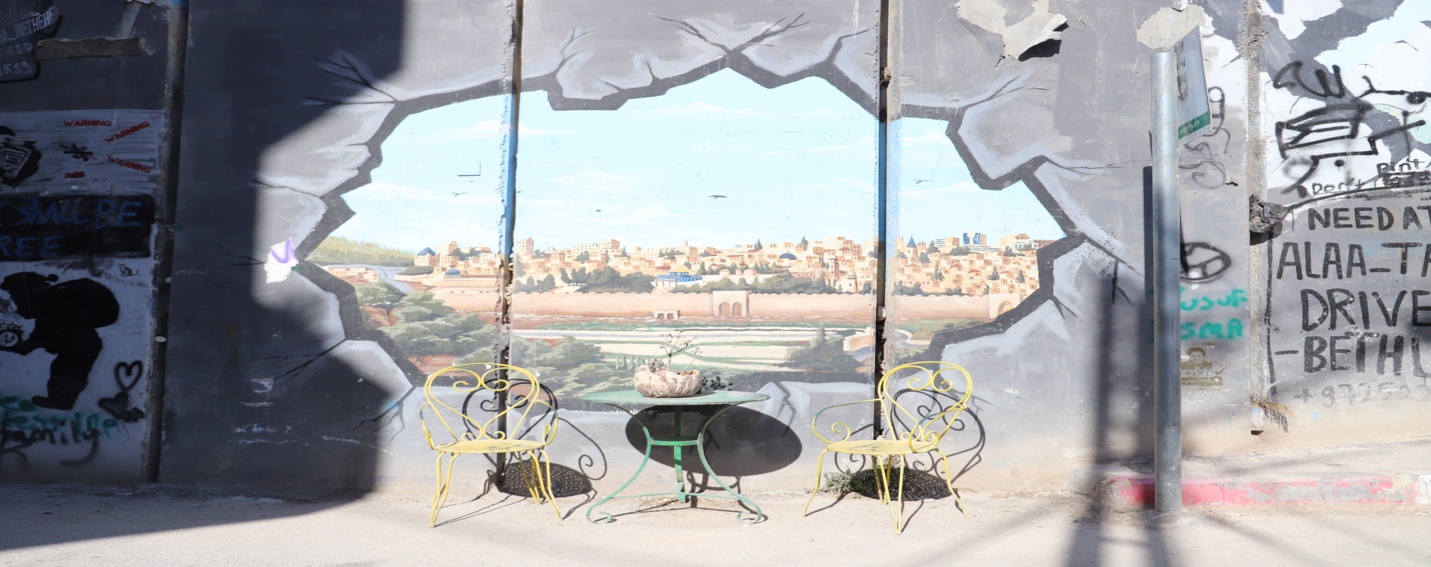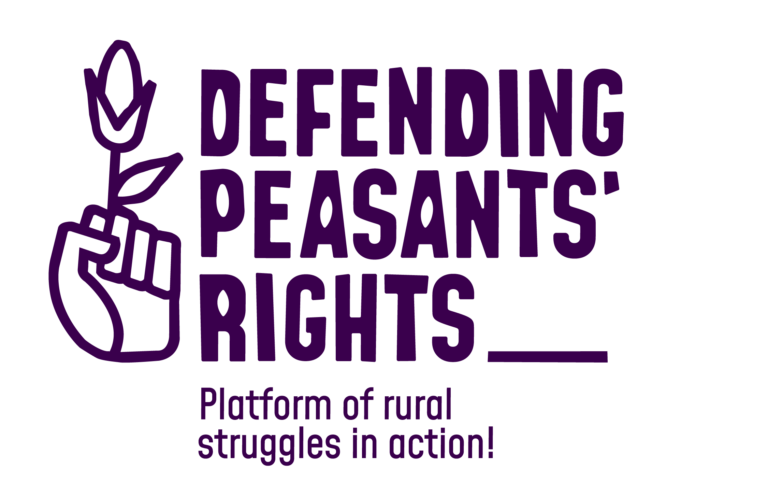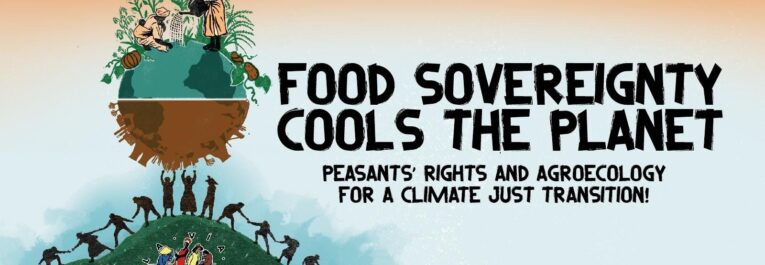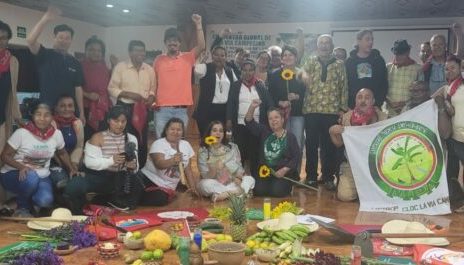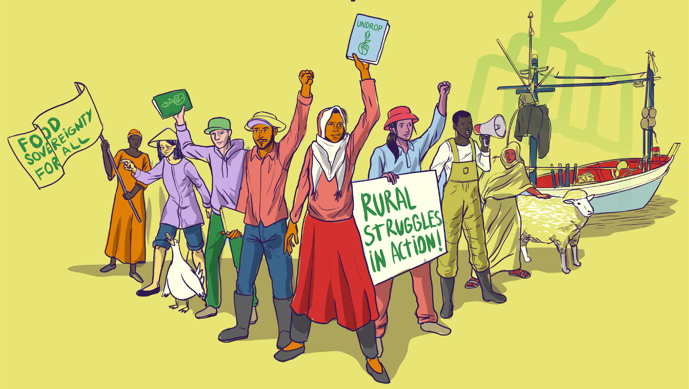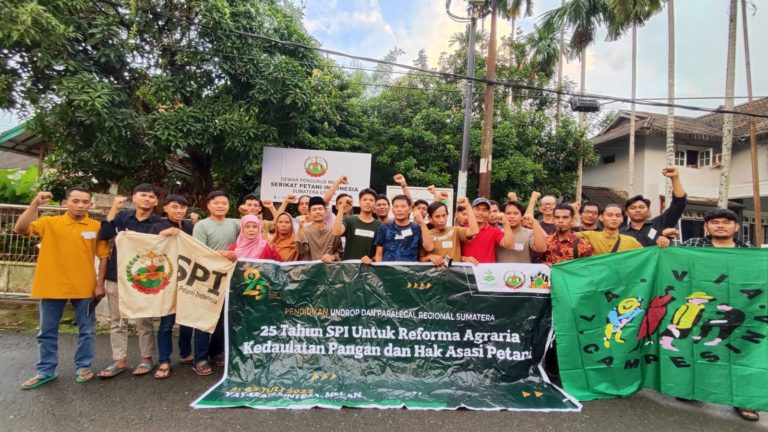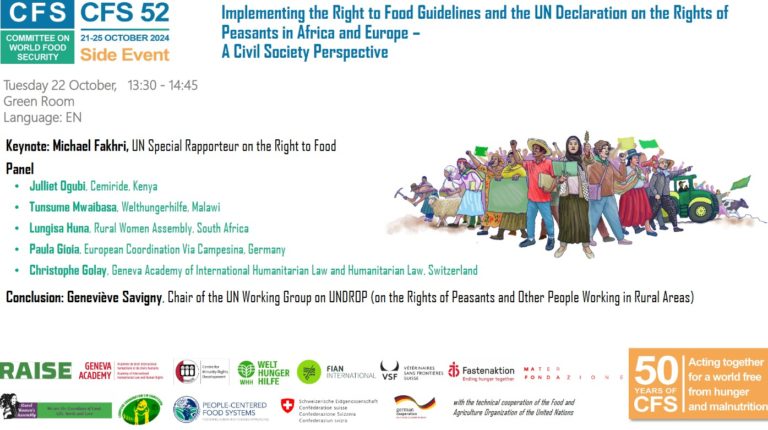Farming Where the World Looks Away
Article written by Fuad Abu Saif, Palestinian grassroots activist and researcher in the struggle for land and dignity, affiliated with the Union of Agricultural Work Committees (UAWC) and member of the international coordination of La Via Campesina. This article was written for Defending Peasants’ Rights, as part of the International Day of Peasant’s Struggles on April 17. So that, on this day, our eyes turn to the Palestinian peasants, to their suffering, to the violence they endure, but also to their continual and ever-renewed resistance to remain rooted in their land.
You can find the pdf of the article to download at the bottom of the page.
Introduction
In the open fields of the Jordan Valley and along the rocky slopes of South Hebron, Palestinian farmers are fighting to exist. Here, agriculture is a daily act of survival under an entrenched colonial system that deploys law, violence, and economic strangulation to sever people from their land.
Since October 2023, the West Bank has entered a new phase of intensifying dispossession. Nothing is arbitrary. Demolition orders are executed with bureaucratic precision, settler violence expands with full military protection, and vital resources, such as water, pasture, and mobility are cut off under the guise of “sovereignty.” In a telling and unapologetic statement, Israeli Finance Minister Bezalel Smotrich boasted a few days ago that 2024 marked a record year in demolitions of Palestinian homes and structures, celebrating it as a successful imposition of Israeli control over Area C. In such an openly hostile environment, the notion of development becomes absurd, and even basic stability feels out of reach.
This violence is not incidental, it is structural. Palestinian farmers are not seen as individuals violating regulations, but as geographical obstacles to be removed. In places like Wadi al-Seeq and Khan al-Ahmar, Bedouin and rural communities face methodical attacks: crops burned, wells poisoned, livestock stolen, and movement blocked. These are part of a deliberate strategy to create unlivable conditions and force displacement without a single official expulsion order.

Since October 2023, the West Bank has entered a new phase of intensifying dispossession. Nothing is arbitrary. Demolition orders are executed with bureaucratic precision, settler violence expands with full military protection, and vital resources, such as water, pasture, and mobility are cut off under the guise of “sovereignty.” In a telling and unapologetic statement, Israeli Finance Minister Bezalel Smotrich boasted a few days ago that 2024 marked a record year in demolitions of Palestinian homes and structures, celebrating it as a successful imposition of Israeli control over Area C. In such an openly hostile environment, the notion of development becomes absurd, and even basic stability feels out of reach.
On the economic front, agriculture is being choked. Israeli occupation controls 85% of the West Bank’s water resources, while Palestinians are denied permission to drill or maintain wells. According to World Bank data, Palestinian agricultural productivity has declined by at least 35% in the past six months. In stark contrast, nearby Israeli agricultural settlements thrive with unrestricted access to water, infrastructure, and international markets, highlighting the stark inequality embedded in the land.
To view the Palestinian farmer solely as a symbol of resilience or nostalgia is to miss the point. Today, the farmer is the frontline defender of sovereignty, environmental justice, and the right to life itself. The struggle is not about a single harvest, it is about safeguarding the very possibility of continued Palestinian presence on the land, beyond the urban ghettos and fragmented enclaves.
This article seeks to expose the brutal system of violence that lies behind these violations, and to amplify the voices of farmers—women and men—who continue to cultivate their land in defiance, in remembrance, and with steadfast belief that the land will endure beyond the regime that seeks to erase them.
Erasing Communities Through Land Theft and Expulsion
The Israeli occupation’s decades-long policy of land confiscation and forced displacement in the West Bank has intensified dramatically since October 7, 2023, transforming into a large-scale operation aimed at redrawing the region’s demographic reality. The strategy underpinning this process is no longer confined to isolated acts of dispossession, it has evolved into a systematic campaign of territorial erasure and demographic engineering, targeting the very foundation of Palestinian agricultural life.
According to the United Nations Office for the Coordination of Humanitarian Affairs (OCHA), Israel has seized over 50,000 dunams of Palestinian agricultural land in the months following October 2023, marking the largest wave of confiscation in more than two decades. These land grabs are concentrated in critical farming regions, including the northern Jordan Valley, South Hebron Hills, and rural belts surrounding Nablus and Salfit. These areas are not arbitrarily chosen they represent the agricultural heartlands of Palestine and the last remaining spaces where traditional farming practices persist despite settler expansion and military control.
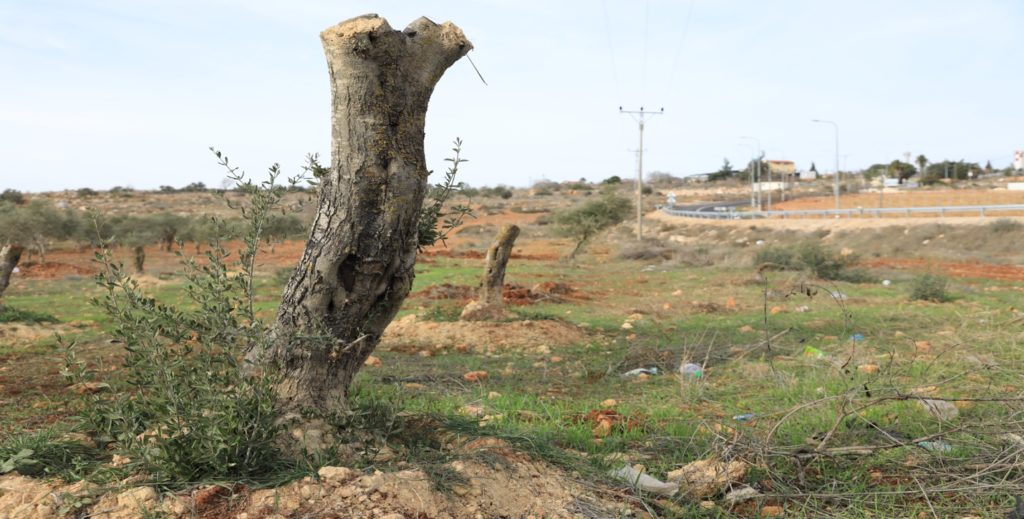
Parallel to this, the rate of forced displacement has surged. More than 180 farming families have been expelled from their homes, primarily in Area C, where Israel retains full civil and military authority. These expulsions are often preceded by a dual onslaught, first, the issuance of demolition or eviction orders under opaque legal frameworks, second, a barrage of settler violence ranging from crop arson and livestock theft to live ammunition attacks and house burnings. These acts are typically carried out with impunity and under the watch or protection of Israeli military forces.
Villages such as Al-Zubeidat and Ein al-Hilweh in the Jordan Valley, and Masafer Yatta in the South
Hebron Hills, have borne the brunt of this aggression. In these and other rural communities, settler militias backed by Border Police and armed with military-grade weapons regularly invade farmland, intimidate residents, and destroy property. The objective is clear, to render these areas uninhabitable for Palestinians, forcing them to relocate and paving the way for further settler expansion. Amnesty International and B’Tselem have documented dozens of such coordinated attacks between October 2023 and March 2024.
The expansion of settlements is the backbone of this strategy. Since October, the Israeli government has advanced plans for over 13,000 new settlement units in the West Bank, a 40% increase from previous years. These projects are accompanied by the construction of new settler-only bypass roads and military checkpoints, which dissect Palestinian lands into disconnected enclaves. In many areas, Palestinians must now pass through electronic gates or obtain military permits to access their own farmland. The effect is a slow but deliberate strangulation of Palestinian rural life, where movement, cultivation, and community cohesion are all progressively undermined.
Beyond the material impact, these actions erode the social fabric of farming communities. When a single road severs a village from its market or when one night’s settler raid results in the loss of an entire season’s crops, the blow is not only economic but also psychological. Farmers are being pushed into an impossible choice, either endure a life under constant threat or abandon the land that has sustained their families for generations. As agricultural livelihoods collapse, families are left with no alternative but to seek precarious jobs in Israeli settlements or migrate to urban centers, further entrenching economic dependency on the very forces dispossessing them.
This campaign of dispossession coincides with one of the deadliest episodes in modern Palestinian history, the ongoing genocide in Gaza, where more than 160,000 people have been killed or injured. While global attention is focused on the war in Gaza, Israeli occupation is quietly accelerating its project of demographic transformation in the West Bank. According to a 2025 Blinx report, the current year has already set a record for home demolitions in the West Bank—a staggering reflection of Israel’s attempt to erase entire Palestinian communities under the radar of the international system.
In sum, the confiscation of land and forced displacement in the West Bank are tools of ethnic engineering. These policies are designed to establish irreversible “facts on the ground,” fragment Palestinian geography, and destroy the possibility of a viable, contiguous Palestinian state. At their core, they represent an attack on existence itself turning every Palestinian farmer into a frontline defender of identity, dignity, and
survival.
Escalating Settler Attacks
The past months have witnessed a dangerous transformation in settler violence across the West Bank. No longer limited to isolated attacks, it has evolved into an organized and sustained campaign of ethnic cleansing, deliberately targeting Palestinian farmers and their communities. Armed settler groups, operating with increasing coordination and impunity often under the watch or protection of Israeli military forces are now central to a broader strategy aimed at clearing rural Palestine of its indigenous population and tightening colonial control over the land. According to Amnesty International (2024), there have been over 410 documented attacks on Palestinian farmers in the four months following the outbreak of the genocide war in Gaza, representing a 75% increase compared to the same period the year before. These assaults are methodical, coordinated, and executed with a clear objective, to sever the relationship between Palestinians and their land.
The tactics used are both violent and symbolic. In the Ramallah and Nablus areas, particularly in villages like Turmus Ayya, Al-Mughayyir, and Madama, settlers have destroyed over 6,200 olive trees, many of them centuries old. The olive tree, a symbol of Palestinian rootedness and economic survival, is now being uprooted from the cultural and economic identity of the people. Beyond agricultural sabotage, the attacks have taken on a more militarized nature. Human Rights Watch (2024) reported 45 arson attacks on homes, storage facilities, and grain silos in villages near settlements, carried out after coordinated settler raids under the protection of the Israeli army. Palestinian firefighters were often prevented from accessing the areas, allowing fires to consume essential infrastructure and livestock assets.
Perhaps the most alarming development is the rise in direct physical assaults. B’Tselem (2024) has
documented 380 violent incidents, including beatings, live fire, and forced expulsion of families while working on their lands. At least 10 farmers have been killed, and dozens have suffered serious injuries, with many left permanently disabled and unable to return to agricultural work.
These incidents are forming part of a broader systemic policy. In just a few months, settlers have seized 270 Palestinian farming plots, and these takeovers are rarely, if ever, contested by Israeli authorities. On the contrary, over 85% of legal complaints filed by Palestinians related to settler attacks have been dismissed without investigation, signaling official complicity in the process of ethnic cleansing. One of the most alarming features of current settler violence is the direct and visible coordination between armed settlers and Israeli “Border Guard” forces. In areas such as Masafer Yatta, Qusra, and Al-Zubeidat, settlers often arrive in organized convoys, many visibly carrying automatic weapons, while the Israeli military either stands by or actively assists by restricting Palestinian movement, issuing arbitrary evacuation orders, or closing access roads. This militarized landscape has pushed entire farming communities to the brink. Since October 2023, more than 180 Palestinian families have been forcibly displaced due to a combination of settler attacks and military-enforced isolation. The ongoing violence is suffocating the Palestinian agricultural system, undermining its viability by generating fear, sabotaging essential infrastructure, and denying farmers access to their land and water. This is a deliberate strategy of gradual and systemic erasure.
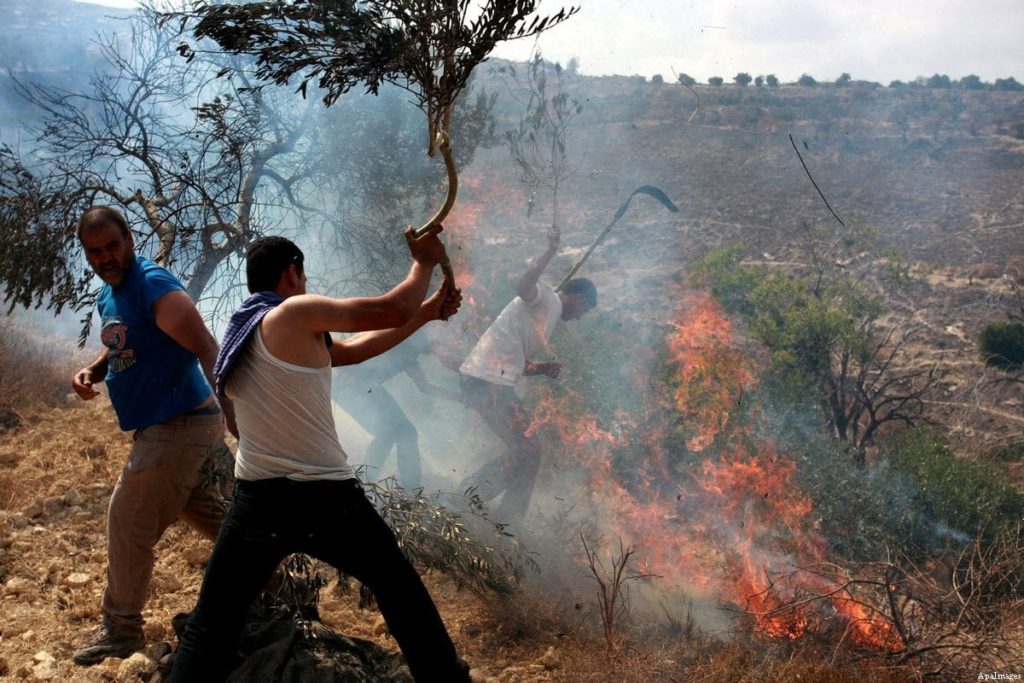
[Wagdi Eshtayah/Anadolu Agency]
This form of settler-colonial violence must be seen for what it is a state-backed campaign to dismantle the rural Palestinian economy, fracture community cohesion, and forcibly transform independent agricultural producers into a labor force dependent on Israeli markets and wages.
The international community, while preoccupied with the catastrophic genocide unfolding in Gaza, must not overlook this parallel process in the West Bank, a process that uses the tools of colonial expansion, apartheid enforcement, and settler terror to uproot Palestinians from their land, deny them their right to food, and destroy the foundations of their rural existence.
Weaponized Water Policy and the Fragmentation of Palestinian Agriculture
In the West Bank, water scarcity is a direct outcome of Israeli policy aimed at controlling vital resources and weakening Palestinian agricultural resilience. Since October 7, 2023, Israeli authorities have intensified restrictions on water access, deepening a decades-old system of hydro-political control designed to erode Palestinian self-sufficiency and consolidate settler-colonial expansion.
According to Amnesty International (2024), Israeli occupation exerts control over more than 85% of West Bank water resources, while systematically denying Palestinians permits to drill wells or repair existing systems. Since the war’s escalation, over 240 agricultural wells have been destroyed or sealed by Israeli forces—a 20% increase from the previous year (OCHA, 2024). These wells, particularly concentrated in the Jordan Valley and the South Hebron Hills, were essential to irrigating farmlands. Their loss has contributed to a 32% drop in irrigated agricultural land and the near-collapse of vegetable and citrus production in large parts of the West Bank (FAO, 2024).
Water scarcity is further compounded by soaring costs: the price of transported water has surged by 65% since late 2023, making irrigation unaffordable for most smallholder farmers. In areas like Salfit, Tubas, and Qalqilya, many families have either shifted to drought-tolerant grains or abandoned agriculture altogether, leading to widespread loss of income and employment.
Israeli forces have also targeted basic water infrastructure. B’Tselem (2024) reports numerous cases where military units confiscated water tanks used for irrigation, especially in remote farming communities lacking piped networks. In parallel, over 75 natural springs once vital to Palestinian herders have been seized or converted into exclusive settler parks and recreational sites, further limiting community access to essential water sources.
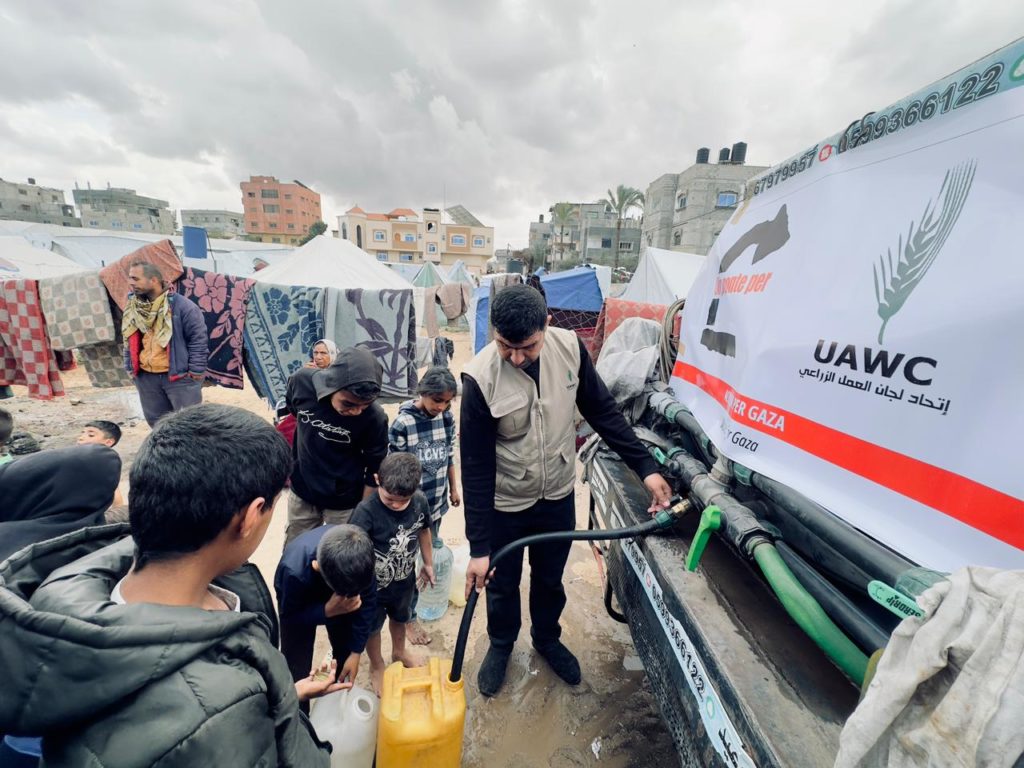
The economic consequences are severe. The World Bank (2024) notes that food inflation across the West Bank has surpassed 41%, a direct result of disrupted production and shrinking local supply. This crisis disproportionately affects rural and low-income households, who now face a dual burden, declining agricultural revenue and unaffordable staple food prices. Simultaneously, the collapse of local food systems has entrenched Palestinian dependency on Israeli markets and international aid.
In Gaza, the picture is even more catastrophic. The ongoing blockade and war have paralyzed the entire water infrastructure. Over 70% of greenhouses and irrigation systems have been destroyed, and 98.1% of households without water access report having ceased farming entirely (FSALWG, 2025). Access to clean water has become nearly impossible, with contamination risks rising and essential water purification supplies barred from entry.
Article 11 of the International Covenant on Economic, Social and Cultural Rights (ICESCR) enshrines the right to adequate food and freedom from hunger, while General Comment No. 15 explicitly recognizes access to water as fundamental to human dignity and health. The systematic denial of water to Palestinians, including the destruction of wells and discriminatory permit regimes, stands in clear violation of these obligations.
These dynamics are not coincidental, they represent a deliberate strategy of agricultural destabilization. By cutting off water, restricting infrastructure repair, and favoring settler access, Israel is implementing a system of structural water apartheid that violates international law. In the Palestinian context, water is a political weapon. The occupation’s water policy has become a central mechanism for uprooting Palestinian rural life, dismantling the foundations of food sovereignty, and deepening economic and territorial dependency. The struggle for water is thus inseparable from the broader fight for land, dignity, and self-determination.
Food Sovereignty as a Defiant Practice Against Structural Erasure
Today, Palestinian farmers cultivate under conditions that far exceed the limits of hardship. Their fields are encircled by settlements, monitored by military watchtowers, and under constant threat of demolition or seizure. In this context, farming is no longer a routine livelihood, it has become a politically charged act. Each cultivated plot, each harvest pulled from threatened soil, is a testimony to persistence and a refusal to vanish. Confronted with isolation, destruction, and exclusion, farmers insist on staying, planting, nurturing, and renewing their connection with the land as part of the broader Palestinian struggle for freedom and self-determination.
This daily resistance extends beyond military restrictions to include denial of access, destruction of
infrastructure, confiscation of tools, and obstruction of markets. According to the Institute for Middle East Studies (IMES, 2024), over 70% of farmers in Area C reported facing direct obstacles or attacks that disrupted or damaged their work during the past year.
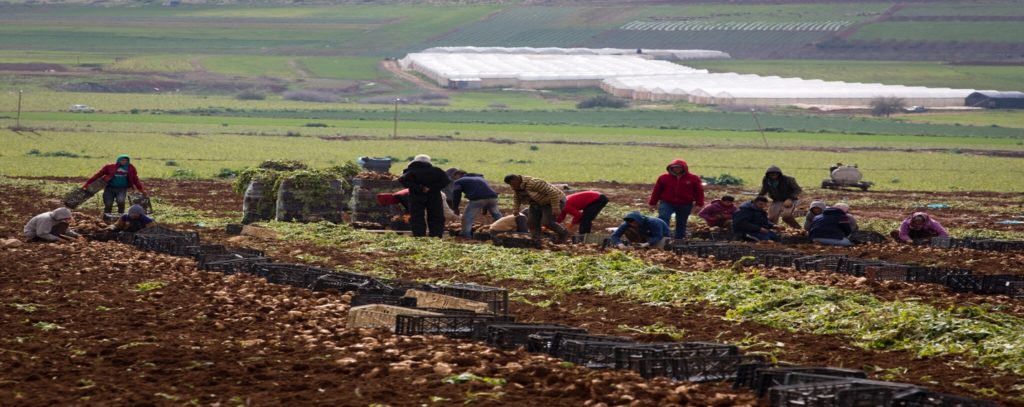
In response to escalating pressure and systemic deprivation, many Palestinian farming communities are turning back to traditional agricultural knowledge rooted in generations of experience. Central to this revival is the seed bank established by the Union of Agricultural Work Committees (UAWC), which preserves and distributes local, drought-resistant seed varieties. These seeds saved, exchanged, and cultivated outside the reach of Israeli and multinational corporate control have become living symbols of food sovereignty and defiance, enabling Palestinian farmers to reclaim control over what they grow and how they grow it. In doing so, they resist the imposed dependency on external input systems and assert a locally driven agricultural future built on resilience, memory, and autonomy.
Alongside these efforts, farmers are reclaiming rainwater harvesting, dryland farming, stone terracing, and low-cost agroecological methods. These are strategic, regenerative responses to Israeli restrictions on water. According to the International Institute for Environment and Development (IIED, 2024), 44% of Palestinian farmers in restricted or closed areas have adopted at least one traditional technique in the past year, not only to survive but to continue cultivating under siege.
Food sovereignty in the Palestinian context is not a slogan. It is a lived, daily assertion that
challenges systems of displacement and erasure, reconnects communities with their land, and
redefines survival not despite occupation, but in resistance to it.
Farming as a Frontline in the Struggle for Liberation
In Palestine, farming is not carried out under normal conditions. It happens under siege, in the shadow of bulldozers, and amid the daily threat of erasure. What is unfolding across rural communities is a calculated effort to sever people from their land, to empty the countryside of its inhabitants, and to break collective will through the coordinated tools of seizure, arson, blockade, and hunger.
Yet the land is still being cultivated as an act of determination. Those who plant today are not simply chasing a harvest، they are holding onto a lineage, affirming through their labor that land is not measured in hectares but in dignity, memory, and life itself. Each season tilled by Palestinian hands writes a new line in the ongoing story of defiance.
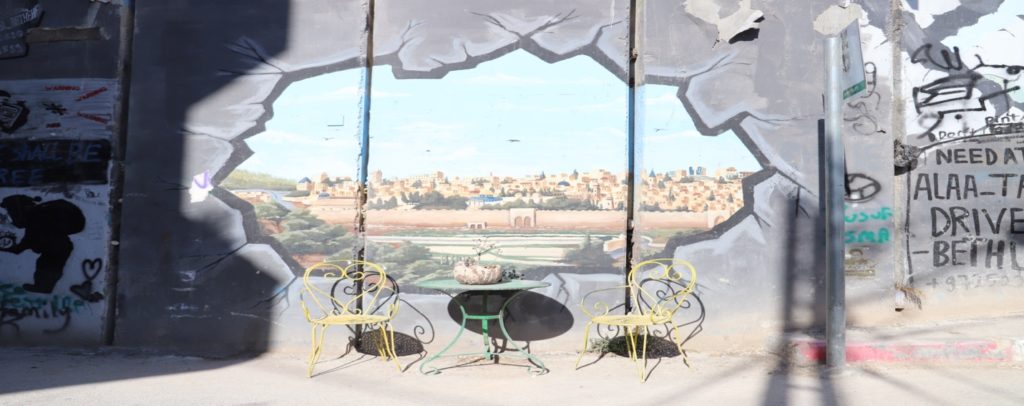
Within this landscape, the Union of Agricultural Work Committees (UAWC) is building a different reality. Its work defends resources, reclaims land, strengthens food sovereignty, and reweaves agricultural life into a framework of resistance and survival. Whether through preserving native seeds, supporting agroecological production, or creating farmer-led cooperatives, UAWC helps communities endure with structure, strength, and purpose.
Farming in Palestine is a deliberate, daily decision to remain rooted. Every act of cultivation under
occupation declares that the land will not be abandoned, even when it is fenced, bombed, or seized. In this struggle, agriculture becomes more than food production, it becomes politics, protection, and a way forward.
Palestinians are planting their future, holding their ground, and challenging the world to see what rooted resistance truly looks like. And in that, there is a call not just for solidarity, but for shared commitment.

